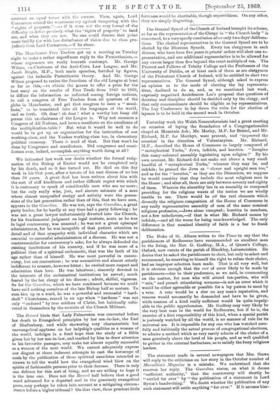We intimated last week our doubt whether the formal resig-
nation of the Bishop of Exeter would not be completed only by his death, and so it has turned out. He died on this day week in his 91st year, after a tenure of his vast diocese of no less than 38 years. A great deal has been written about him with the sort of stiff kindliness and rather difficult regret with which it is customary to speak of considerable men who are no more ; but the only really wise, just, and sincere estimate of a man whose almost unequalled energy and activity were the posses- sions of the last generation rather than of this, that we have seen, appears in the Guardian. He was not, says the Guardian, a great party leader, for he hardly at any time had a party following ; he was not a great lawyer unfortunately diverted into the Church, for his fundamental judgment on legal matters, acute as he was in legal controversy, was unsound; he was not a great episcopal administrator, for he was incapable of that patient attention to detail and of that sympathy with individual character which are essential to successful administration of a diocese. He was not a controversialist for controversy's sake, for he always defended the existing institutions of his country, and if he was more of a political than of a spiritual ecclesiastic, that was the fault of his age rather than of himself. He was most powerful in contro- versy, but not contentious ; he was unsensitive and almost utterly indifferent to censure, however bitter ; he excited more respect and admiration than love. He was laborious ; sincerely devoted to the interests of the ecclesiastical institutions he served ; much feared by the lax clergy of his diocese ; adroit, skilful, vigorous. So far the Guardian, which we have condensed because we could have said nothing ourselves of the late Bishop half so mature. To sum him up in a word, he was a powerful and successful " hard- shell " Churchman, reared in an age when " hardness " was not only " endured " by true soldiers of Christ, but habitually culti- vated in themselves by the recruits of the Church Militant.






























 Previous page
Previous page